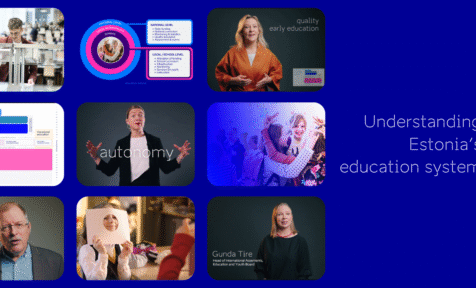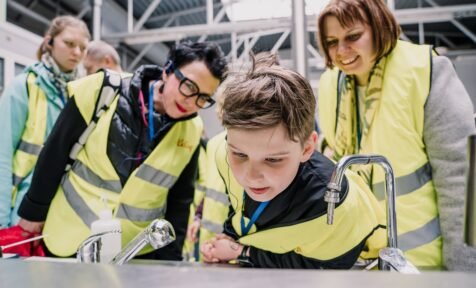The ProgeTiger programme launched in 2012 in Estonia aims primarily to develop school students’ digital competence, technological literacy, and fundamental understanding of technology. The programme has targeted kindergartens and schools across Estonia, while also closely focusing on the skills of teachers to deliver technology education.
The original article by Alexandra Burchill was published in the third issue of EU Chip Chronicles, a leading publication that provides in-depth insights and news from the semiconductor industry across Europe.
As of 2021, almost all Estonian general education schools (98%) and kindergartens (99%) had joined the programme, with partners from universities and industry involved in the programme’s design. Moreover, as of 2022, 1 in 9 students in Estonia choose to study ICT at the bachelor’s or applied higher education level of study, which rises to 1 in 7 among students who choose to pursue master’s degrees. To better understand how the programme has been successful in providing effective technology education in Estonian schools, ALLPROS. eu interviewed Kirke Kasari, ProgeTiger programme manager, on the programme’s structure and unique qualities. In this article, we take a closer look at a selection of the programme’s distinctive qualities.
Interconnected activities
ProgeTiger’s success lies in its interconnected activities. Over the years, ProgeTiger has developed a comprehensive curriculum, provided learning materials, conducted extensive teacher training, and established a robust network of mentors and educators. This network has crucially provided the support for the educators, who carry out the main activities of the programme, to educate and engage their students, while getting help from and sharing knowledge with colleagues.
The project’s curriculum, developed with input from universities, the Ministry of Education, teachers, and the informatics teaching union, integrates multiple perspectives of education and technology expertise. The curriculum emphasises practical, real-life applications of technology, mirroring industry and academic environments. This approach also helps students and teachers develop essential “soft” skills such as teamwork and collaboration, which are vital in the STEM industry.
Strong educational network
ProgeTiger’s outreach efforts have been instrumental in its widespread adoption. By encouraging schools and kindergartens to participate, the project has built a strong network of educators who actively use and contribute to the ProgeTiger materials. These networking activities are supported by regular events for students and teachers to participate in, showing off their classroom activities and the success and innovation of teachers as leaders.
Initially, the programme focussed on integrating modern technological equipment into the classroom, with some funding for schools to purchase this equipment. This enabled students to engage in creative, hands-on learning rather than being confined to theoretical knowledge. An important tool ensuring teacher’s success in integrating this new equipment as a practical learning resource was the ProgeTiger portal, where teachers could both upload and access detailed teaching plans incorporating these technologies. In fact, creating accompanying teaching materials was a prerequisite for securing equipment funding. Meanwhile, this guaranteed the success of the portal through the spread of teachers’ creatively designed lesson plans, supporting and inspiring other teachers from schools participating in ProgeTiger.
Flexibility and evolution
Although the programme has been widely implemented in various forms across Estonian schools, one of the challenges ProgeTiger has faced is the elective nature of informatics education in Estonia. For measuring the programme, this has made it difficult to standardise and collect comprehensive statistics on its impact, as there is no compulsory subject or material that must be taught as part of ProgeTiger.
However, the optionality of ProgeTiger also allowed for its successful qualities. Teachers are free to adapt the curriculum according to their constraints, learners’ needs, and teaching strengths. Ultimately, this means that they deliver enjoyable, effective, relevant, and high-quality technology education for students. Additionally, positioning teachers as leaders in implementing the curriculum meant that the teachers’ network emerged for promoting collaboration and sharing materials, knowledge, and experience. This network continues to sustain the programme by providing fundamental support to teachers.
Looking ahead, ProgeTiger aims to enhance ICT learning in later stages of education, paralleling the emphasis seen in vocational training. The project’s ongoing long-term success is supported by Estonia’s national educational strategy, which prioritises digital education and competence development. This strategic alignment ensures continual investment and innovation within the programme.



